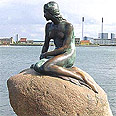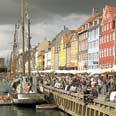

BLUE HILL, Maine - To novelist Beth Gutcheon, the rescue of Denmark's Jews during the Nazi occupation more than 60 years ago was an inspiring but little-known story that demanded to be told.
Gutcheon, who summers on Maine's coast, was astonished that so few Americans were aware that the citizens of that small country spontaneously rallied in the autumn of 1943 to hide nearly all of its 7,000 Jews and then shuttled them clandestinely to safety in Sweden.
She decided to relate that story by weaving it into a novel.
"I'm not a nonfiction writer," she said. "I'm not trained as a reporter or a historian, and I have spent my whole adult life becoming a storyteller. So for me that was going to be the only option."
Denmark's profile in courage is the centerpiece of her latest novel, "Leeway Cottage," a family saga of four generations that is set in large part at their summer colony in the fictitious town of Dundee on the Maine coast.
The story revolves around Sydney Brant, an unhappy young woman born to wealth and privilege who moves to New York to pursue a singing career and get away from her hostile and overbearing mother.
She falls in love with Laurus Moss, a gifted Danish pianist. The two marry as war clouds envelop Europe.
When World War II breaks out and the Nazis invade Denmark, Laurus' concerns about his country and his family - his mother is Jewish - lead him to England, where he helps to build a Danish Resistance movement.
In her quest for historical accuracy, Gutcheon combed books and documents and spoke with Danes who experienced the occupation or had relatives in the Resistance.
She spent about a week visiting the places in Denmark that she describes in the book, even though she had a familiarity with the country after working there as an au pair when she was 18.
Widespread suffering
What Gutcheon discovered led her to expand her focus beyond the rescue operation to the work of the Resistance, which blew up railroad tracks, sabotaged factories helping the German war effort and smuggled downed Allied airmen to safety.
"I realized that the real untold story was that the Danish Jews were all saved, but the young Danish partisans suffered by the thousands, and they suffered terribly," she said.
Among them is Laurus' sister, Nina, whose capture leads to a horrific confinement in Ravensbruck, a Nazi concentration camp for women that was infamous for gruesome medical experiments conducted by the SS, the Nazi special police.
Laurus' work with the Resistance and his siblings' experiences under the occupation lead to a psychological gulf that develops in his marriage after the war when he returns home to Sydney and their first child, born while he was in London.
Sydney, a woman of enormous needs and marked limitations, shows little interest in her husband's wartime activities and displays scant sympathy for Nina, whom she finds cold. Laurus, who values peace and contentment, understands Sydney's good qualities and tunes out the others. While their differences might drive them apart, their love for each other is genuine and the marriage - like that of many like-minded couples of that era - endures.
Gutcheon first learned of the Danes' rescue of the Jews when she was 10 and watched Danish-born pianist and humorist Victor Borge relating on television how King Christian X told Adolf Hitler that if he ordered Jews to wear yellow armbands, he would put on one, too, and all other Danes would follow suit.
That story, although untrue, was widely accepted, Gutcheon said, because it spoke to the character of Denmark's people and their deep belief that all Danes should be treated equally.
"It has its power as a story because it really is essentially true," she said.
'Mystery about character'
What led the Danes to take a stance unlike that of any other nation under Nazi occupation is a question that Gutcheon has pondered.
"The story about what happened in Denmark is a mystery about character, and the mystery of the character of an entire country," she said.
She cites the influence of N.F.S. Grundtvig, a remarkable 19th-century minister, academic and philosopher who is best known as the father of folk high schools and a pioneer in adult education. He believed that an essential part of being Danish is that all Danes are valued equally.
"He established that every Dane is as valuable as every other Dane," Gutcheon said, a belief that was absorbed by Danes in the same way Americans were shaped by the Declaration of Independence and the Bill or Rights. So when Danes are reminded about the heroism of their countrymen, they tend to dismiss it as nothing out of the ordinary.
Novelist Ben Cheever, a fan of Gutcheon, said "Leeway Cottage" is her best work, one that has the makings of a classic and is reminiscent of William Thackeray's "Vanity Fair."
"There's this tremendous depth," Cheever said. "The characters are all complicated and unpredictable." Even though he knew through Danish friends of what the Danes had done during the war, Cheever said he was deeply moved by Gutcheon's account.
Attention to details
One of those whom Gutcheon drew upon for advice was former soap opera star Alexandra Moltke Isles, whose father served as a courier to the Resistance. Isles, who produced and directed the 1995 documentary film, "The Power of Conscience: The Danish Resistance and the Rescue of the Jews," said she was amazed at the depth of Gutcheon's research.
"The details are so on target," she said. "And there were things I hadn't known."















